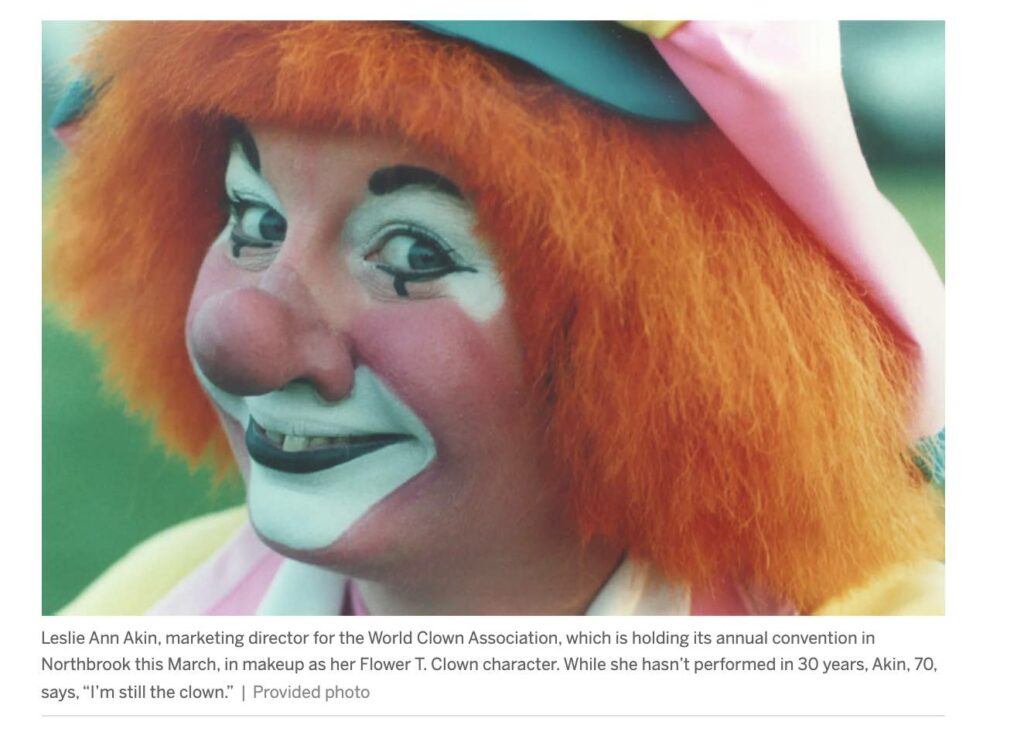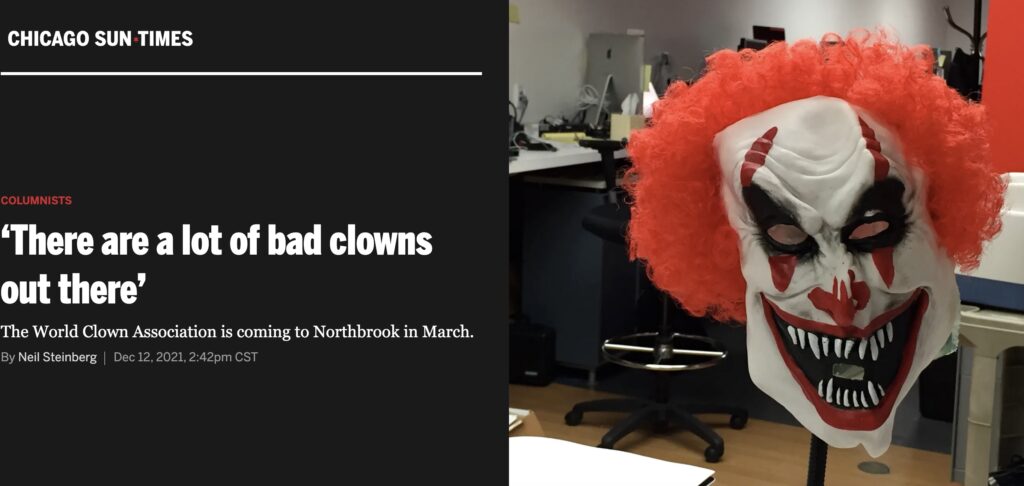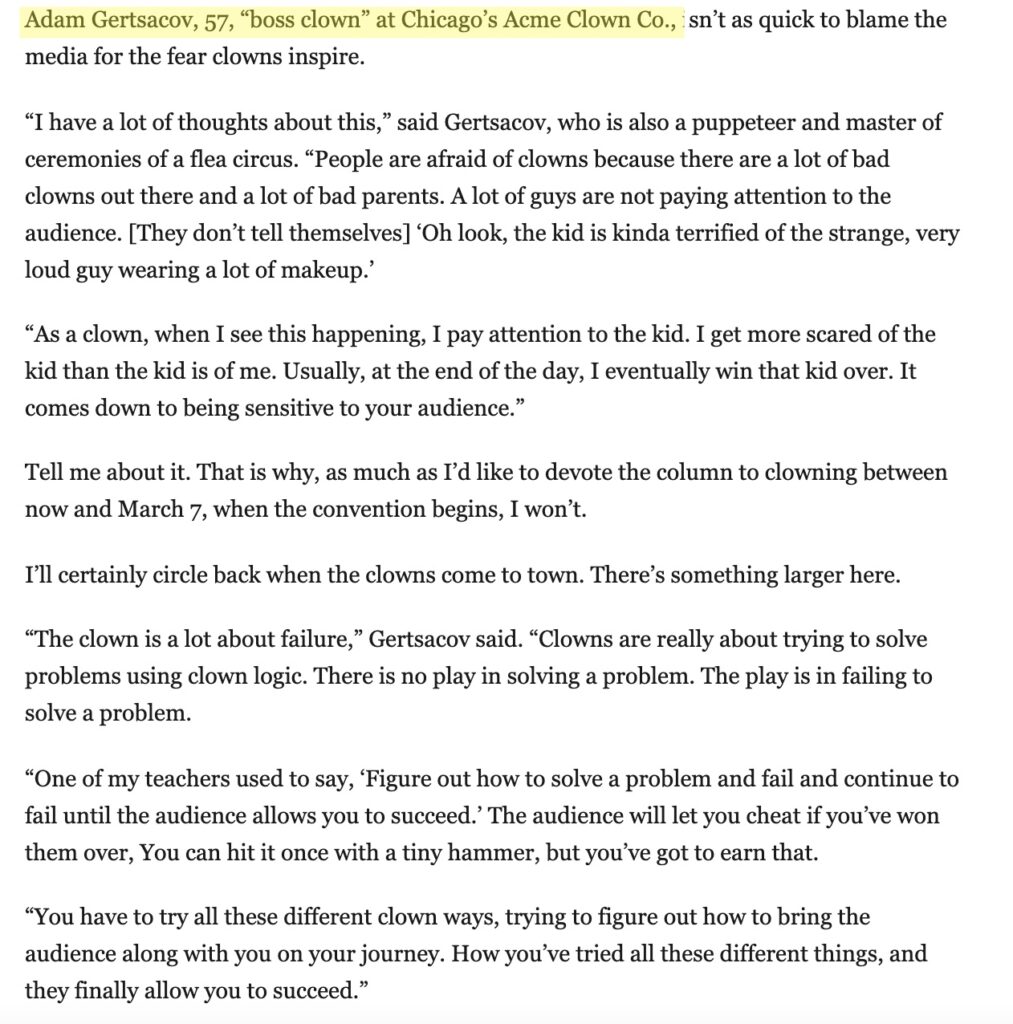“There Are A Lot of Bad Clowns” –Quoted in the Chicago Sun Times
I got a call a few days ago from someone looking to talk about clowns. And since that is one of my favorite subjects, I was more than happy to oblige.
Now I don’t purport to be a spokesperson for clowns, or represent clowns on the whole. I wouldn’t say I’m a particularly good role models for other clowns to follow. I follow my thoughts and my heart, wherever it leads, and I try to do well.
The person who wanted to talk about clowns was Neil Steinberg, columnist for the Chicago Sun-Times. the World Clown Association is coming to Chicago in 2022, and he wanted some thoughts on the dilemma of clowns in the age of COVID and IT. And I was happy to oblige. We had a great and far ranging conversation, talking about his book about failures, a friend of his who performs in the Mud Show, and a lot more. And yeah, we talked about clowns.
Of course, I didn’t think they’d take a quip I made and turn it into the title/pull quote of the article! https://chicago.suntimes.com/columnists/2021/12/12/22830684/clowns-world-clown-association
I get it– it doesn’t represent the ancient and honorable art of clowning particularly well. It’s not good for the industry. I am helping to perpetuate the myth of evil clowns. (Although to be fair, if you read the article, I am not talking about evil clowns)
I guess I won’t be winning any clown ambassadorships anytime soon!
But I think what I say about failure, and about why people are afraid of clowns (bad clowns and bad parenting and a failure to listen to your audience) is right on the money.
What do you think? Am I wrong?
Let me know in the comments!
Here’s the full article if you are interested:=====
There are a lot of bad clowns out there’
The World Clown Association is coming to Northbrook in March.
Clowns don’t terrify me. Not the way they do others. But I understand the fear. Clowns have a way of popping out when you least expect them.
For instance. I had just begun to grind my way through The Economist’s special “The World Ahead 2022†issue, with articles like “Ensuring a fair future of work,†and “Calendar: Our selection of events around the world.â€
The events of world importance move from France becoming head of the European Council in January, to Queen Elizabeth marking the 70th anniversary of her reign in February, when the winter Olympics also opened in Beijing.
Then bam, clowns, and close to home, too. This March: “Coultrophobics should avoid Northbrook, Illinois, as participants converge for the World Clown Association’s annual convention.†It was the first occurrence of note in North America.
Did not see that coming. How is that happening in my own leafy suburban paradise?
“We’re looking forward to it; can hardly wait to get together,†said Leslie Ann Akin, marketing director of the World Clown Association, who estimated that up to 300 clowns will attend. “There are competitions, classes, all sorts of educational opportunities. Vendors— people coming that sell costuming, props, rubber noses, floppy shoes, baggy pants, all the things that clowns love.â€
The public is welcome. How’d they settle on Northbrook?
“We had it there a couple of years ago,†Akin said. “They loved it and are thrilled to come back.â€
In 2014, though it galls me to admit. Here Chicago politicians can’t have an impure thought without the Sun-Times watchdogs stopping whatever they’re doing and freezing, heads cocked, sniffing the air, sensing something afoot.
Meanwhile hundred of clowns can slip into my own backyard and hold a big party, and I don’t find out for years. Sorry, chief.
Talk about being terrified by clowns. You’ll notice the Economist squib, brief though it was, started mentioning “â€Coultrophobia,†fear of clowns, a situation that torments those in the clown biz.
“It just breaks my heart,†Akin said.

A Washington Post article about the 2018 convention has difficulty even summarizing the myriad ways our culture demonizes clowns:
“…. decades of portrayals of depressed, malevolent and downright crazed clowns in movies and on TV, not to mention in real life: Krusty on ‘The Simpsons,’ Zach Galifianakis on ‘Baskets,’ Twisty on ‘American Horror Story,’ the Great Clown Scare of 2016, Insane Clown Posse, Heath Ledger’s Joker, Jack Nicholson’s Joker, John Wayne Gacy.â€
â€When people say, ‘I’m afraid of clowns,’ I would say, ‘No, you’re not.’ I would not accept it,†Akin said. “You’ve seen terrible movies with actors. They’re actors, in some sort of makeup. Not clowns.â€
Adam Gertsacov, 57, “boss clown†at Chicago’s Acme Clown Co., isn’t as quick to blame the media for the fear clowns inspire.
“I have a lot of thoughts about this,†said Gertsacov, who is also a puppeteer and master of ceremonies of a flea circus. “People are afraid of clowns because there are a lot of bad clowns out there and a lot of bad parents. A lot of guys are not paying attention to the audience. [They don’t tell themselves] ‘Oh look, the kid is kinda terrified of the strange, very loud guy wearing a lot of makeup.’
“As a clown, when I see this happening, I pay attention to the kid. I get more scared of the kid than the kid is of me. Usually, at the end of the day, I eventually win that kid over. It comes down to being sensitive to your audience.â€
Tell me about it. That is why, as much as I’d like to devote the column to clowning between now and March 7, when the convention begins, I won’t.
I’ll certainly circle back when the clowns come to town. There’s something larger here.
“The clown is a lot about failure,†Gertsacov said. “Clowns are really about trying to solve problems using clown logic. There is no play in solving a problem. The play is in failing to solve a problem.
“One of my teachers used to say, ‘Figure out how to solve a problem and fail and continue to fail until the audience allows you to succeed.’ The audience will let you cheat if you’ve won them over, You can hit it once with a tiny hammer, but you’ve got to earn that.
“You have to try all these different clown ways, trying to figure out how to bring the audience along with you on your journey. How you’ve tried all these different things, and they finally allow you to succeed.â€


